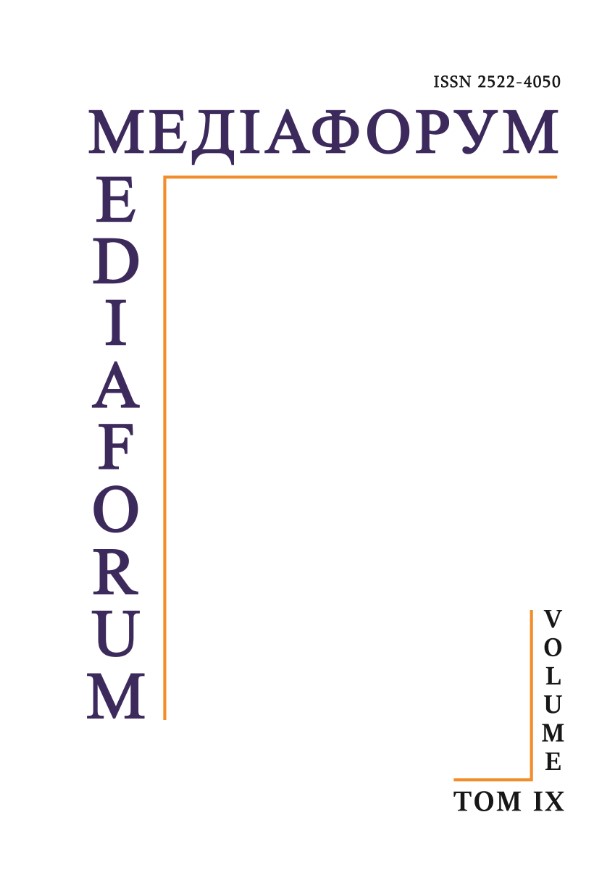Geopolitical Positioning of Azerbaijan as a Factor in Modelling the Political participation of the country’s citizens
DOI:
https://doi.org/10.31861/mediaforum.2021.9.128-143Keywords:
political participation, geopolitical positioning, Azerbaijan, Azerbaijanism, geopolitical identityAbstract
The article analyzes the features of Azerbaijan's geopolitical positioning as a factor in modeling the political participation of citizens of this country. The study of this problem was carried out using the methodological principles of constructivism and theories of political participation. It has been proved that the peculiarities of Azerbaijan's geopolitical positioning are caused by its multi-level nature, reflected in the format of Azerbaijanism as a model of geopolitical identity and the corresponding officially enshrined policy. The idea of Azerbaijan as a system of views that reflects the geopolitical identity of the Azerbaijani people is a convergence of its traditions, national and moral values and is aimed at protecting the independence and democratic development of Azerbaijan. The official declaration of Azerbaijan's belonging to various civilization systems made it possible to form a space of trust and dialogue both at the level of bilateral relations and at the level of regional cooperation. The main tool for modeling the political participation of Azerbaijani citizens and their foreign policy orientations is the official statements of President I. Aliyev, which focus on partnerships with Turkey, the actualization of Russia, Georgia and Iran as partners in regional cooperation and Armenia (after the resolution of the Nagorno-Karabakh conflict) as a potential partner.
Downloads
References
Gabibbeyli. I. A. 2012. Etapy formirovaniya ideala azerbaydzhanstva i sovremennost. Skhіdniy svіt. 4: 41–48.
Karmazina M., Bevz T., Rotar N., Napadysta V. 2017. Vyklyky j intehracijni perspektyvy Ukrajiny v konteksti rosijsʹkoji ahresiji v Krymu ta Donbasi: analiz ocinok zarubižnyx analitykiv i ekspertiv. K.: IPiEND im. I. F. Kurasa NAN Ukrajiny, 2017.
Mamedov. F. 2018. Geopoliticheskaya identichnost Azerbaydzhana v kontekste vyzovov i perspektiv ХХІ veka.URL: https://globalaffairs.ru/articles/geopoliticheskaya-identichnost-azerbajdzhana-v-kontekste-vyzovov-i-perspektiv-xxi/#_ftn1 (accessed 4 March 21)
Ofitsialnyy sayt Bakinskogo mezhdunarodnogo gumanitarnogo foruma. 2014. Rech Prezidenta Azerbaydzhana Ilkhama Aliyeva 2 oktyabrya 2014 goda. URL: http://old.bakuforum.az/ru/az%C9%99rbaycan-respublikasinin-prezidenti-c%C9%99nab-ilham-%C9%99liyevinnitqi/index.html (accessed 1 March 21)
Prezident Azerbaydzhanskoy Respubliki. 2017. Ilkham Aliyev prinyal uchastiye v panelnom obsuzhdenii v ramkakh Myunkhenskoy konferentsii po bezopasnosti. 18 fevralya 2017. URL: http://ru.president.az/articles/22827
Rossiyskiy kulturno-informatsionnyy tsentr v Baku. 2019. O predstavitelstve. URL: http://aze.rs.gov.ru/%C2%A0%C2%A0%C2%A0%C2%A0%C2%A0%C2%A0%C2%A0%C2%A0/about (accessed 16 March 21)
Rotar, N. 2007. Polityčna učastʹ hromadjan Ukrajiny u systemnyx transformacijax perexidnoho periodu. Černivci: Ruta, 2007.
Rustamova. A. 2019. Azerbaydzhanstvo kak sintez natsionalnykh i obshchechelovecheskikh idey. Kaspiy. 14 iyunya. № 106. URL: https://www.elibrary.az/docs/qazet/qzt2019_3042.pdf (accessed 8 March 21)
Altstadt, A. 2017. Frustrated Democracy in Post-Soviet Azerbaijan. New York: Columbia University Press.
Azərbaycan Respublikasi Prezidentinin Seçkiləri. 2013. 9 Oktyabr 2013-Cü Il. Səsvermənin Nəticələri Haqqinda Azərbaycan Re Spublikasi Mərkəzi Seçki Komissiyasinin. URL: http://www.msk.gov.az/uploads/protokollar/Protokol_MSK_2013.pdf (accessed 14 March 21)
Azərbaycan Respublikasi Prezidentinin Seçkilərі. 2018. 11 aprel 2018-ci il. Dairə seçki komissiyalarının protokollarındakı məlumatları ümumil əşdirən cədvəl. URL: http://www.msk.gov.az/uploads/Secki-2018/ProtokolUmumi-2018.pdf (accessed 14 March 21)
Azərbaycan-İran mədəni əlaqələrinin inkişafı məsələləri müzakirə edilib. 2016. Azərbaycan qəzeti. 24 May
Constitution of the Republic of Azerbaijan. 1995. URL: https://mincom.gov.az/en/view/pages/13/ (accessed 14 March 21)
Cornell, S. E., Karaveli, H., Ajeganov, B. 2016. Azerbaijan’s Formula: Secular Governance and Civic Nationhood. Singapore: Central Asia-Caucasus Institute & Silk Road Studies Program. URL: http://silkroadstudies.org/resources/2016-cornell-karaveli-ajeganov-azerbaijan-formula.pdf (accessed 16 March 21)
Dijkink, G. 2002. National Identity and Geopolitical Visions Maps of Pride and Pain. London: Routledge.
EU Neighbours East. 2020. Perceptions of the European Union. Public Opinion in Azerbaijan. Annual Survey 2020. URL: https://euneighbourseast.eu/wp-content/uploads/2020/06/eu_neighbours_east_as2020_factsheet_azerbaijan_eng_0.pdf (accessed 16 March 21)
EU Neighbours East. 2021. Отношения ЕС – Азербайджан в фактах и цифрах. URL: https://euneighbourseast.eu/wp-content/uploads/2021/07/eap-factsheet-azerbaijan-ru.pdf (accessed 16 March 21)
Flint, C. 2016. Introduction to Geopolitics, 3rd Edition. London and New York: Routledge.
Goyushov, A. 2018. The Language of Azerbaijan: Turkish or Azerbaijani? Baku Research Institute. URL: https://bakuresearchinstitute.org/azerbaijani-turk-dili-yoxsa-az%C9%99rbaycan-dili/ (accessed 16 March 21)
Hille, C. 2010. State Building and Conflict Resolution in the Caucasus. Leiden: Brill.
Hirose, Y. 2016. The Complexity of Nationalism in Azerbaijan. International Journal of Social Science Studies. 4(5): 136–149.
Krebs, M. 2015. From cosmopolitan Baku to tolerant Azerbaijan – Branding “The Land of Fire”. Identity Studies. 6: 110–129.
Landau, J. M.; Kellner-Heinkele, B. 2011. Language Politics in Contemporary Central Asia: National and Ethnic Identity and the Soviet Legacy. London, New York: I. B. Tauris.
President of the Republic of Azerbaijan Ilham Aliyev. 2019. Joint press statements of Presidents of Azerbaijan and Ukrainian. 17 december 2019. URL: https://en.president.az/articles/35337
President of the Republic of Azerbaijan Ilham Aliyev. 2020. Joint press statements of Presidents of Azerbaijan and Turkish. 10 december 2020. URL: https://en.president.az/articles/50868
President of the Republic of Azerbaijan Ilham Aliyev. 2020a. Statements. URL: https://en.president.az/documents/statements
President of the Republic of Azerbaijan Ilham Aliyev. 2020b. Statement by the President of the Republic of Azerbaijan, Prime Minister of the Republic of Armenia and President of the Russian Federation. 10 november 2020. URL: https://en.president.az/articles/45923
President of the Republic of Azerbaijan Ilham Aliyev. 2021. Statement by President of the Republic of Azerbaijan, Prime Minister of the Republic of Armenia and President of the Russian Federation. 11 january 2021. URL: https://en.president.az/articles/50070
Rezvani, B. 2013. Ethno-territorial Conflict and Coexistence in the Caucasus, Central Asia and Fereydan. Amsterdam: Vossiuspers Amsterdam University Press.
Tabachnik, M. 2019. “Citizenship, Territoriality, and Post-Soviet Nationhood: The Politics of Birthright Citizenship” in Azerbaijan, Georgia, and Moldova. Palgrave Macmillan: 142–164.
Wiktor-Mach, D. 2017. Religious Revival and Secularism in Post-Soviet Azerbaijan. Berlin, Boston: De Gruyter.















